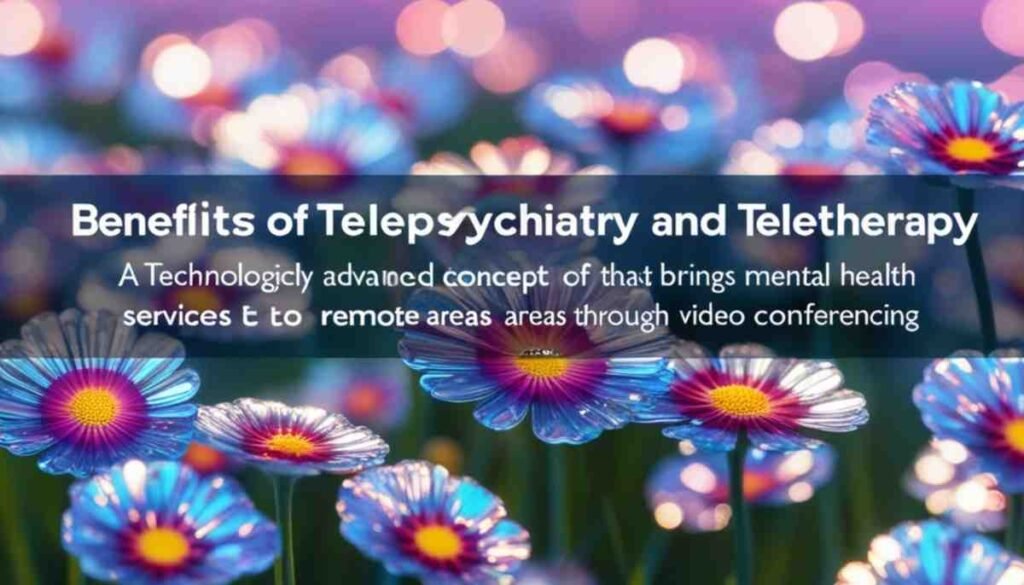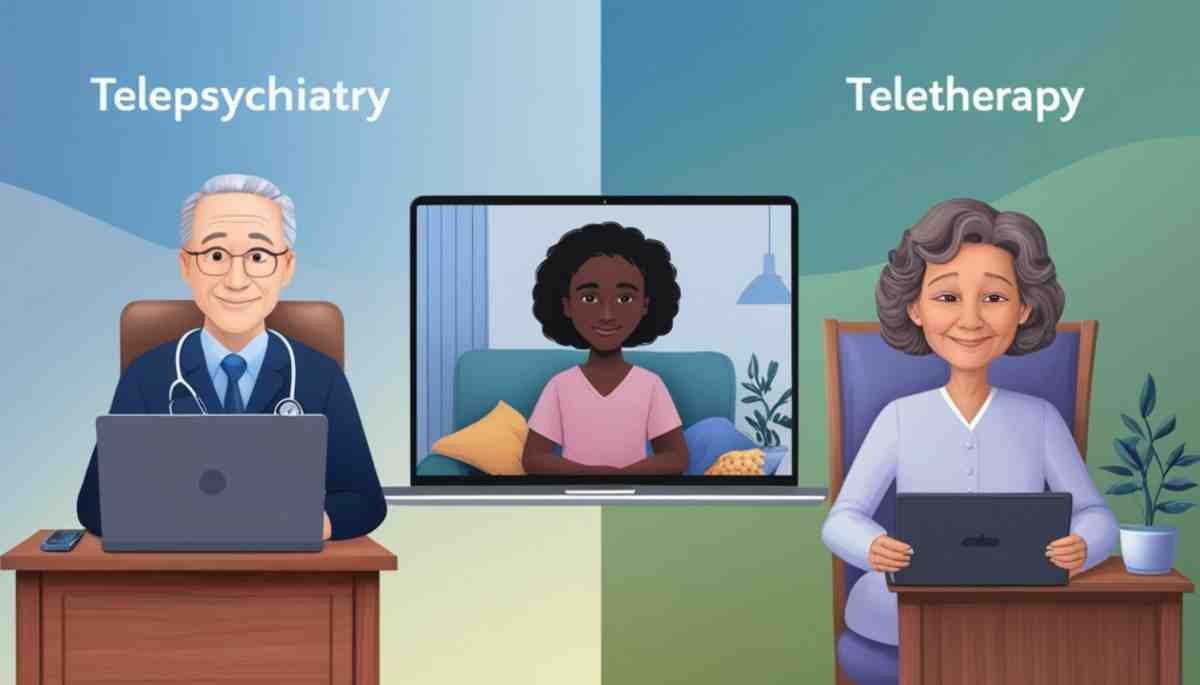Telepsychiatry focuses on diagnosing and treating mental health conditions with medical interventions, while teletherapy provides talk-based support to address emotional and psychological challenges. The major advantage of Telepsychiatry is that it allows licensed psychiatrists to prescribe medication and manage symptoms for conditions like depression, anxiety, or bipolar disorder, making it ideal for those needing medical treatment.
In comparison, teletherapy emphasises non-medical approaches such as counselling, discussions and psychotherapy, helping individuals to manage stress, relationship issues, or life transitions. Collectively, both terms refer to online mental health care but cater to different aspects of treatment, involving distinct practitioners and approaches. While teletherapy focuses on talk therapy sessions, primarily with licensed therapists, telepsychiatry extends to medication management, typically administered by psychiatrists or advanced nurse practitioners. By understanding these differences, patients can choose the most appropriate remote mental health service to meet their needs effectively.
Helpful Scenario Table For Your Decision While Choosing Telepsychiatry or Teletherapy
| Scenario | Recommended Service | Practitioner | Key Actions |
| Needing Medication | Telepsychiatry | Psychiatrist | Regular medication reviews and monitoring. |
| Seeking Emotional Support | Teletherapy | Licensed Therapist | Weekly or bi-weekly talk therapy sessions. |
| Managing Chronic Symptoms | Telepsychiatry | Psychiatrist | Structured evaluations and integrated care. |
| Working Through Life Stressors | Teletherapy | Licensed Therapist | Goal-oriented counseling for immediate issues. |
Action-Oriented Decision Guide
- Evaluate Your Need: If symptoms suggest medication, prioritise telepsychiatry. For support and guidance without medication, teletherapy is suitable.
- Consider Treatment Goals: Use telepsychiatry for conditions requiring medical management (e.g., bipolar disorder) and teletherapy for therapeutic support (e.g., anxiety, relationship issues).
- Set Frequency Expectations: Telepsychiatry may require monthly check-ins for medication review, while teletherapy often involves weekly sessions.
1. What Is Telepsychiatry?
Telepsychiatry is a form of telemedicine that provides psychiatric services through digital platforms like video calls, phone calls, or messaging. It allows patients to receive psychiatric care remotely from a licensed psychiatrist, who can diagnose, treat, and prescribe medication for mental health disorders.

Key Characteristics of Telepsychiatry:
- Diagnosis and Treatment: Telepsychiatrists can evaluate mental health conditions such as depression, anxiety, bipolar disorder, and schizophrenia.
- Medication Management: This service often includes prescribing and adjusting medication to manage mental health symptoms.
- Emergency Care: Telepsychiatry can provide immediate psychiatric intervention during mental health crises.
2. What Is Teletherapy?
Teletherapy offers remote counselling and psychotherapy services through digital communication, including video sessions, phone calls, or chat. Licensed mental health professionals such as psychologists, licensed clinical social workers, or professional counsellors provide these services. Teletherapy focuses on discussing emotions, thoughts, and behaviours to help individuals cope with life challenges.
Key Characteristics of Teletherapy:
- Talk Therapy: Emphasis is placed on discussing personal issues, such as stress, relationships, or anxiety, with a therapist.
- Therapeutic Techniques: Techniques like cognitive-behavioral therapy (CBT), Solution-Focused Brief Therapy (SFBT) and mindfulness may be used to help patients by providing quick, actionable solutions to immediate challenges.
- Emotional Support: It addresses issues related to stress management, relationships, or adjustment to life changes.
3. How Do Telepsychiatry and Teletherapy Differ?
Both approaches are effective for mental health care, but they have different purposes.
a. Services Provided:
- Telepsychiatry involves medical treatment, including medication, for complex mental health conditions.
- Teletherapy focuses on talk-based support and therapeutic techniques without involving medical treatment.
b. Provider Qualifications:
- Telepsychiatrists: Licensed medical doctors (MDs or DOs) with specialized training in psychiatry. They can prescribe medication.
- Teletherapists: Include licensed psychologists and counselors who offer therapy sessions but cannot prescribe medication.
c. Insurance Coverage:
- Telepsychiatry is often covered under medical insurance policies due to its medical nature.
- Teletherapy coverage varies by insurer and state regulations, with some services requiring out-of-pocket payments.
d. Suitability:
- Telepsychiatry is appropriate for individuals needing medication for conditions like bipolar disorder, schizophrenia, or severe depression.
- Teletherapy is more suitable for managing stress, relationship issues, or mild to moderate anxiety.
4. Benefits of Telepsychiatry and Teletherapy
Both forms of remote care share similar benefits.
a. Accessibility For Patients:
- Benefit: Patients can receive care without leaving home, which is helpful for individuals with limited mobility or those living in rural areas.
b. Convenience For Patients:
- Benefit: Appointments can be scheduled flexibly, reducing time spent commuting to an office.
c. Consistency of Care:
- Benefit: Regular follow-up sessions help maintain continuous support and treatment progress.

5. Choosing Between Telepsychiatry and Teletherapy
The choice depends on the individual’s needs:
- Telepsychiatry: For those who require medical management and prescription of medication.
- Teletherapy: For those seeking talk therapy to cope with stress, life transitions, or emotional issues.
Key Queries About Telepsychiatry and Teletherapy
How do telepsychiatry and teletherapy differ in terms of services?
Telepsychiatry involves diagnosing mental health conditions, prescribing medication, and managing symptoms, while teletherapy focuses on counseling and psychotherapy without prescribing medication.
Which conditions are best treated through telepsychiatry?
Telepsychiatry is suitable for conditions requiring medical intervention, such as bipolar disorder, schizophrenia, or severe depression.
Can teletherapists prescribe medication?
No, only telepsychiatrists, who are licensed medical doctors, can prescribe medication.
Is teletherapy covered by insurance?
Coverage for teletherapy varies by insurer and state. It may require out-of-pocket payments or be covered partially, depending on the plan.
Are teletherapy sessions effective for severe mental health disorders?
Teletherapy can be beneficial for many mental health issues, but those with severe conditions requiring medication may need telepsychiatry or a combination of both services.
